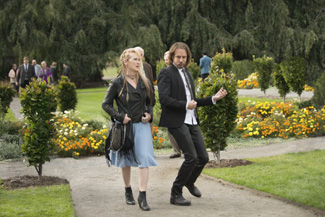|
|
Movie Review: Ricki and the FlashBy Ben GruchowAugust 13, 2015
The low point is that dinner sequence, which also introduces us to Ricki’s two sons and a few others. It’s an agonizingly protracted scene that seemingly exists only to have every character verbalize a single assigned personality trait and run it into the ground. It’s a good example of how something that reads appropriately on the page sinks or swims based on an actor’s handling. Here, it sinks; there’s visibly an effort early in the film to draw a straight line between Julie’s divorce and her sense of abandonment by her mother, but it’s overshadowed by the showiness of the acting. There are other false notes: an altercation between Julie’s parents and her own ex-husband feels misplaced (fair is fair, though: Streep still sells Ricki’s parting shot). At other times, the movie seems to forget that while Ricki is perhaps a little emotionally damaged, she’s not the destructive person certain scenes make her out to be. The screenplay may set this up as a somewhat accurate reflection of a woman who thinks she doesn’t know how to offer the proper support to another person, and therefore doesn’t even try, but it doesn’t make for much of a personal anchor to grab onto. We don’t get much of a sense of who Ricki is, despite her appearance in every scene, and so Ricki and the Flash just drifts for a good chunk of its running time. It’s also choppily edited at points; there’s a cut from a phone conversation in a grocery store to the exterior of an apartment complex that momentarily takes us out of whatever’s happening in the story because we’re trying to regain our bearings.
|

|
|
|

|
Thursday, October 31, 2024
© 2024 Box Office Prophets, a division of One Of Us, Inc.


